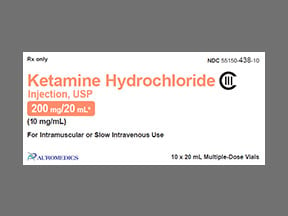
Ketalar Coupons & Savings Card – Discount Prices from $1.01
Brand for: Ketamine
My prescription
Edit
5ML of 10MG/ML, Ketamine (1 Plas Cont)
Select pharmacy

CVS
$23.25
COUPON PRICE
Walmart
$1.01
COUPON PRICE
Albertsons
$8.59
COUPON PRICE
Walgreens
$8.75
COUPON PRICEKetalar savings card
Show this card to your pharmacist
Walmart
$1.01
BIN
ID
PCN
GRP
019876
LH3A044CBD
CHIPPO
LHX
Powered by
Related NMDA receptor antagonists prescriptions
Related NMDA receptor antagonists prescriptions
Ketalar (Ketamine) dosage forms
Dosage Quantity Price from Per unit 10ML of 50MG/ML 1 Vial $1.16 $1.16 10ML of 50MG/ML 2 Vials $7.30 $3.65 10ML of 50MG/ML 3 Vials $12.24 $4.08 10ML of 100MG/ML 1 Vial $11.09 $11.09 10ML of 100MG/ML 2 Vials $14.68 $7.34 10ML of 100MG/ML 3 Vials $18.27 $6.09 20ML of 10MG/ML 1 Vial $11.84 $11.84 20ML of 10MG/ML 2 Vials $16.19 $8.10 20ML of 10MG/ML 3 Vials $20.53 $6.84
| Dosage | Quantity | Price from | Per unit |
|---|---|---|---|
| 10ML of 50MG/ML | 1 Vial | $1.16 | $1.16 |
| 10ML of 50MG/ML | 2 Vials | $7.30 | $3.65 |
| 10ML of 50MG/ML | 3 Vials | $12.24 | $4.08 |
| 10ML of 100MG/ML | 1 Vial | $11.09 | $11.09 |
| 10ML of 100MG/ML | 2 Vials | $14.68 | $7.34 |
| 10ML of 100MG/ML | 3 Vials | $18.27 | $6.09 |
| 20ML of 10MG/ML | 1 Vial | $11.84 | $11.84 |
| 20ML of 10MG/ML | 2 Vials | $16.19 | $8.10 |
| 20ML of 10MG/ML | 3 Vials | $20.53 | $6.84 |
What is ketalar used for?
Ketalar is used as an anesthetic for inducing and maintaining anesthesia during surgical procedures. It is also sometimes used for pain management and sedation in certain medical situations.
How much does Ketalar cost?
The cost of Ketalar can vary depending on factors such as the pharmacy, location, dosage, and whether the patient has insurance coverage. It is recommended to check with local pharmacies or healthcare providers for the most accurate and up-to-date pricing information.
What drug schedule is Ketalar?
Ketalar, which is a brand name for ketamine, is classified as a Schedule III controlled substance in the United States. This classification indicates that it has a moderate to low potential for physical and psychological dependence.
What class of drug is Ketalar?
Ketalar is classified as a dissociative anesthetic.
